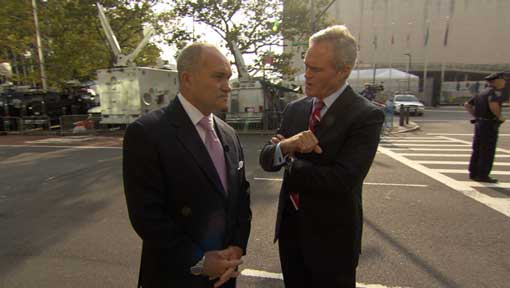
Speaking at an RTDNA conference the other day, Jeff Fager, chairman of CBS News, decried the lack of investigative reporting by television news operations these days.
"I think a lot of people shy away from it because it's expensive and it's difficult and it takes a lot of time," he told his audience of digital news professionals. "We succeed at 60 Minutes by doing it and by caring about it and by working hard to make it as interesting as we can, because there is a place for it and I think there's a hunger for it out there."
Well, good for Fager, and amen to all that. But in all honesty, I would be a happier news junkie if those television journalism operations would simply do a better job of contextualizing the news they already report.
Take, for instance, the shocking -- shocking! -- revelation a few days ago that the U.S Justice Department had paid 16 hard-earned taxpayer bucks each for muffins at a conference on immigration at a Hilton hotel in Washington. Make your blood boil?
At least two evening newscasts, NBC's and ABC's, reported this ostensibly outrageous example of government waste that had been brought to light by the Justice Department's own Inspector General's office. The evening-news reports included mouthwatering shots of fresh, steaming muffins -- blueberry, I think -- and video of government officials sheepishly defending the expenditure. Vice President Biden was said to be demanding a review of all breakfast spending.

I was incensed for about three seconds. I shook my head in disgust.
Then I started to think about what I'd just been shown. And I found myself wondering:
Did the Justice Department's event planners just walk in and say, "Money's no object. Fleece us, please."
Why didn't the reporters and anchors direct at least a smidgen of their barely contained indignation at the hotel that presumably profiteered?
Or was it profiteering at all? Did the Hilton hotel in fact charge the Justice Department's people more than they charge private businesses holding conferences in its convention center?
I realize that to some of my fellow citizens, particularly those whose preferred caffeinated drink is tea, anything more than federal employees bringing Pop Tarts from home would be considered wasteful spending. But I am inclined to believe that fair, accurate reports would have put the cost of hotel catering into context and left the viewer to decide if the muffin "scandal" was worthy of outrage.
Turns out, the reports were not just lacking context -- they were wrong. A Hilton spokesperson told the Associated Press the next day that the $16 per person charged was standard pricing and that it covered not just a muffin but a continental breakfast -- coffee, fresh fruit, baked goods -- plus tax and gratuity. And that shouldn't surprise anyone who has ever eaten in the coffee shop or ordered room service at a hotel in Washington, New York or most any other large American city.
ABC News and NBC News both subsequently posted the Associated Press' follow-up story on their websites. But if either offered an on-air correction to its flabby reporting, I missed it.
CBS News either missed the muffin story or didn't find it outlandish enough to bother with. But that's not to let CBS off this particular hook.
Last Sunday's season premiere of 60 Minutes, the program that Fager wants all of CBS News to emulate, featured a piece fronted by Scott Pelley, the Evening News anchor, about New York's own personal anti-terrorist operation. To be sure, Police Commissioner Ray Kelly's operation is impressive and then some, but the 60 Minutes take on it was almost laughably rah-rah and gaga. [Photo at top.]
Did it not occur to anyone producing this piece that somebody in New York City might question the amount of public funds Kelly's counterterrorism efforts gobble up? Could they find no one who is not dazzled but deeply worried about the advent of a surveillance system so sophisticated and ubiquitous they could monitor your failure to poop-scoop after your dog? Did they try? Where was the context?
Im all for more ambitious, risk-taking journalistic digging. But hey, let's take care of basics first.